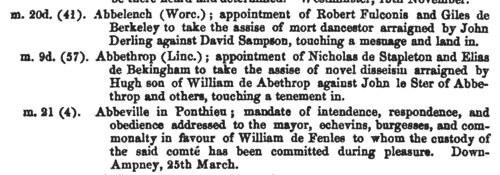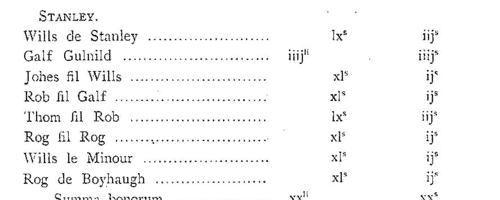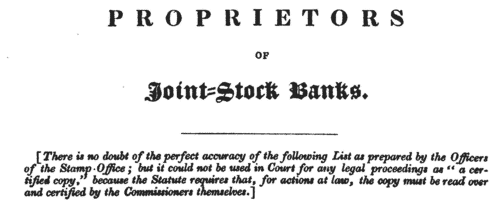Bateley Surname Ancestry ResultsOur indexes 1000-1999 include entries for the spelling 'bateley'. In the period you have requested, we have the following 11 records (displaying 1 to 10): Buy all | | | Get all 11 records to view, to save and print for £72.00 |
These sample scans are from the original record. You will get scans of the full pages or articles where the surname you searched for has been found. Your web browser may prevent the sample windows from opening; in this case please change your browser settings to allow pop-up windows from this site. Patent Rolls: entries for Derbyshire
(1278-1279)
Calendars of the patent rolls of the reign of king Edward I are printed in the Calendars of State Papers: but these cover only a fraction of the material on the rolls. From 1881 to 1889 the reports of the Deputy Keeper of the Public Record Office also include calendars of other material from the rolls - about five times as many entries as in the State Papers - predominantly mandates to the royal justices to hold sessions of oyer and terminer to resolve cases arising locally; but also other general business. The calendar for the 7th year of king Edward I [20 November 1278 to 19 November 1279], hitherto unindexed, is covered here.BATELEY. Cost: £6.00.  | Sample scan, click to enlarge

| Derbyshire Householders
(1327)
Tax return on goods and land held by all lay persons (i. e., non-clergy) in Derbyshire
BATELEY. Cost: £6.00.  | Sample scan, click to enlarge

| Liegemen and Traitors, Pirates and Spies
(1625-1626)
The Privy Council of Charles I was responsible for internal security in England and Wales, and dealt with all manner of special and urgent matters
BATELEY. Cost: £4.00.  | Sample scan, click to enlarge

|  Masters of apprentices registered in Yarmouth
(1761) Masters of apprentices registered in Yarmouth
(1761)
Apprenticeship indentures and clerks' articles were subject to a 6d or 12d per pound stamp duty: the registers of the payments usually give the master's trade, address, and occupation, and the apprentice's name, as well as details of the date and length of the apprenticeship. There are central registers for collections of the stamp duty in London, as well as returns from collectors in the provinces. These collectors generally received duty just from their own county, but sometimes from further afield. The indentures themselves can date from a year or two earlier than this return. (The sample entry shown on this scan is taken from a Bristol return. Each entry has two scans, the other being the facing page with the details of the indenture, length of service, and payment of duty.) IR 1/54BATELEY. Cost: £8.00.  | Sample scan, click to enlarge

|  Apprentices registered at Colchester
(1765) Apprentices registered at Colchester
(1765)
Apprenticeship indentures and clerks' articles were subject to a 6d or 12d per pound stamp duty: the registers of the payments usually give the master's trade, address, and occupation, and the apprentice's name, as well as details of the date and length of the apprenticeship. There are central registers for collections of the stamp duty in London, as well as returns from collectors in the provinces. These collectors generally received duty just from their own county, but sometimes from further afield. The indentures themselves can date from a year or two earlier than this return. (The sample entry shown on this scan is taken from a Durham return. Each entry has two scans, the other being the facing page with the details of the indenture, length of service, and payment of duty.) IR 1/55BATELEY. Cost: £8.00.  | Sample scan, click to enlarge

| Voters in the Eastern Division of Norfolk, for the parish of Great Yarmouth
(1832)
Under the Reform Act of 1832, the County of Norfolk was allotted four Members of Parliament, being two Knights of the Shire for the Eastern Division and two for the Western. The Eastern Division included the hundreds of Blofield, Clavering, Depwade, Diss, Earsham, North Erpingham, South Erpingham, Eynsford, East Flegg, West Flegg, Forehoe, Happing, Henstead, Humbleyard, Loddon, Taverham, Tunstead and Walsham. The franchise was available to freeholders worth 40s a year or over; copyholders and long leaseholders of £10 or more; short leaseholders and tenants of £50 or more: but limited to adult males. Voting took place on 20 and 21 December 1832. This poll book lists the voters for each parish, with the votes cast. Voting was not compulsory, and non-voters are not listed. Each voter had two votes: the votes are indicated in the columns C. (Lord Henry Cholmondeley, 2852); P. (Nathaniel William Peach, 2960); K. (Hon. George Keppel, 3261); and W. (William Howe Windham, 3304). The voters were not necessarily resident in the parish, but derived their franchise from the land there; so some of the names have addresses outside the parish. After the name there may appear the abbreviations cop. for copyholder; oc. for occupier; or le. for leaseholder: the rest are freeholders or annuitants.BATELEY. Cost: £6.00.  | Sample scan, click to enlarge

| Voters in the Eastern Division of Norfolk, for the parish of Halvergate, near Yarmouth
(1832)
Under the Reform Act of 1832, the County of Norfolk was allotted four Members of Parliament, being two Knights of the Shire for the Eastern Division and two for the Western. The Eastern Division included the hundreds of Blofield, Clavering, Depwade, Diss, Earsham, North Erpingham, South Erpingham, Eynsford, East Flegg, West Flegg, Forehoe, Happing, Henstead, Humbleyard, Loddon, Taverham, Tunstead and Walsham. The franchise was available to freeholders worth 40s a year or over; copyholders and long leaseholders of £10 or more; short leaseholders and tenants of £50 or more: but limited to adult males. Voting took place on 20 and 21 December 1832. This poll book lists the voters for each parish, with the votes cast. Voting was not compulsory, and non-voters are not listed. Each voter had two votes: the votes are indicated in the columns C. (Lord Henry Cholmondeley, 2852); P. (Nathaniel William Peach, 2960); K. (Hon. George Keppel, 3261); and W. (William Howe Windham, 3304). The voters were not necessarily resident in the parish, but derived their franchise from the land there; so some of the names have addresses outside the parish. After the name there may appear the abbreviations cop. for copyholder; oc. for occupier; or le. for leaseholder: the rest are freeholders or annuitants.BATELEY. Cost: £6.00.  | Sample scan, click to enlarge

| Shareholders of the Liverpool Union Bank
(1838)
The provincial banks of England and Wales made annual returns to the Stamp Office of their proprietors or shareholders. These returns, registered in March 1838, from the 103 banks then in existence, contain the full names and addresses of nearly 30,000 shareholders.BATELEY. Cost: £6.00.  | Sample scan, click to enlarge

|  British merchant seamen
(1835-1840) British merchant seamen
(1835-1840)
At this period, the foreign trade of ships plying to and from the British isles involved about 150,000 men on 15,000 ships; and the coasting trade about a quarter as many more. A large proportion of the seamen on these ships were British subjects, and so liable to be pressed for service in the Royal Navy; but there was no general register by which to identify them, so in 1835 parliament passed a Merchant Seamen's Registration Bill. Under this act a large register of British seamen was compiled, based on ships' crew lists gathered in British and Irish ports, and passed up to the registry in London. A parliamentary committee decided that the system devised did not answer the original problem, and the original register was abandoned after less than two years: the system was then restarted in this form, with a systematic attempt to attribute the seamen's (ticket) numbers, and to record successive voyages. The register records the number assigned to each man; his name; age; birthplace; quality (S = seaman, &c.); and the name and official number of his ship, with the date of the crew list (usually at the end of a voyage). Most of the men recorded were born in the British Isles, but not all. The system was still very cumbersome, because the names were amassed merely under the first two letters of surname; an attempt was made to separate out namesakes by giving the first instance of a name (a), the second (b), and so on. This section of the register (BT 112/2) covers numbers 1 to 2952 and 20200 to 23034, 5786 different entries, of men whose surnames began with the letters Ba. During 1840 this series of ledgers was abandoned, and a new set started with names grouped together by surname.BATELEY. Cost: £8.00.  | Sample scan, click to enlarge

|  London Policemen
(1878-1891) London Policemen
(1878-1891)
The Metropolitan Police Register of Joiners (MEPO 4/335) lists policemen joining the force 1 July 1878 to 31 December 1891 (warrant numbers 62845 to 77318). The register is alphabetical, in so far as the recruits are listed chronologically grouped under first letter of surname (I and J, and U and V being treated as single initials). It gives Date of Appointment, Name, Number of Warrant, Cause of Removal from Force (resigned, dismissed, promoted or died), and Date of Removal. BATELEY. Cost: £8.00.  | Sample scan, click to enlarge

|
| 1 | 2 |  |
Research your ancestry, family history, genealogy and one-name study by direct access to original records and archives indexed by surname.
|













